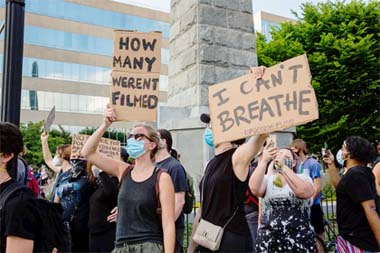

|
Back to |
| The Front Page |
| News & Features |

|
"I can't breathe" |
|
by Bob Alman layout by Reuben Edwards posted June 13, 2020
|
Who ever would have guessed that Big Brother would turn out to be our friend and protector? Passing by a cops-and-robbers scene that didn't seem quite right, we took out our phone, recorded it, and posted it online. Later--much later--the story of the black male victim was undeniably credible, with that photographic evidence, and it made a difference, if not a conviction. One of those cases caught fire and resulted in 16 straight days (still counting) of protests in almost 200 American cities and 18 countries around the world--exacerbating, some say, the pandemic still unchecked in most northern hemisphere countries. George Floyd died with a cop's knee on his neck as three other white policemen watched. After three months or more of "social distancing" and other constraints coming into summer, the most adventurous of us want to get out and play croquet, guided by the best advice and rules from the club, reinforced if necessary with a personal liability waiver. Because, in fact, each person is responsible for what happens to a body. We have seen Big Brother, and he is US.
A local snapshot of the pandemic
Because this is a worldwide problem, I make no apology for quoting local statistics, as an elderly man with at least one "underlying" condition.
The local number of deaths in Palm Beach County continues to escalate, but according to the statistics experts, Palm Beach County's "rate of infection" at 7.9 percent is well below the "alarm" level, of ten percent. Neighboring Brevard County's rate is in the same range, while the epicenter of Florida infections, Miami, is closer to the ten percent mark.
In Florida, deaths in nursing homes still account for 50 percent of the COVID-19 fatalities statewide, and a whopping 85 percent of the deaths have been among those over the age of 65. Rates among blacks and hispanics are markedly higher among demographic racial groups.
Further, the percentage of those testing positive has plateaued or dropped. Of those who have been tested statewide, only 5.2 percent have received positive results.
The "positivity" rates throughout South Florida, which account for roughly 54 percent of all cases and deaths, have been dropping as well.
Without question, the police brutality demonstrations over the last two weeks have increased the numbers--and no "expert" to my knowledge has posited a guess as to how much.
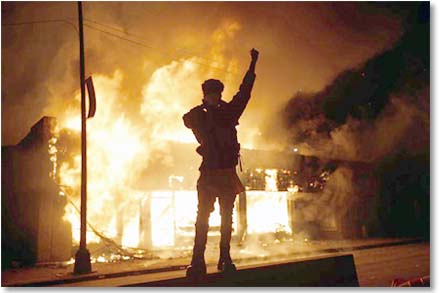
|
| The first images were shocking, as violent reactions soon spread far beyond Minneapolis, seen and photographed in almost 200 cities and towns across the United States, and soon to spread to 18 other countries. |
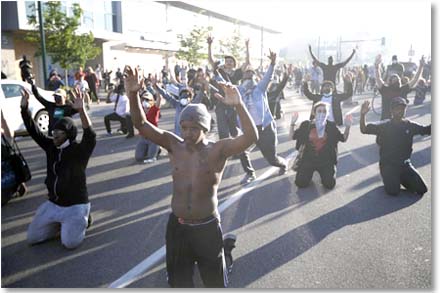
|
| But by the second week, the demonstrations turned peaceful. |
Overall, in the United States
US Croquet clubs have resumed casual play for the most part, under local safety guidelines, and some are doing their usual tournaments this summer--but not many.
The USCA resumes its schedule of events in the fall at the National Croquet Center. In the meantime, members are free to play (after signing a liability waiver) observing "social distancing" and other rules, and an announcement yesterday was emailed to all members advertising "Thirsty Thursdays." The announcement invited "members only" to resume this popular club event--with drinks and pub food available, only the veranda, not in the clubhouse, which is still reserved for staff. Evening croquet and courts open will be open until seven PM.
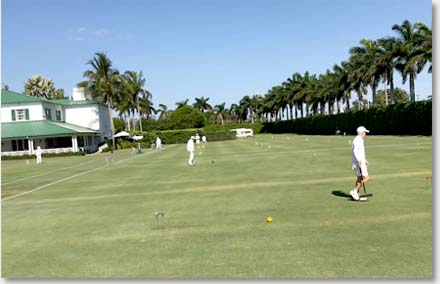
|
| Stage One re-opening at the National Croquet Center in May worked just fine. Stage Two in June looks very different and--for some--alarming. This photo by Bob van Tassel. |
Around the country, USCA events don't begin until September, with the Association Croquet National Championship at Chesapeake Bay Croquet Club. In October the National Croquet Center is calendared to resume a full schedule of events, including USCA schools, the Senior & Masters Championship, the Selection eights. Shall life, by then, be anywhere close to normal? We have yet to see.
The US death toll continues to rise unabated, having surpassed 110,000 early this week. On the previous Sunday after announcing that "all houses of worship" should be opened, the US president--a role model for his base, presumably--played golf. He never wears a mask, and always plays to his base of older, rural, less educated voters.
Three months (counting from early March, when the US began to take the pandemic seriously) is a long time, it turns out, for wage-earners on a short leash, as the pressure has built on government at every level to "re-open" public enterprises, private businesses, and sporting clubs.
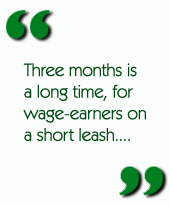 No events requiring travel are currently planned at the National Croquet Center in West Palm Beach before October, when the normal round of events is expected to attract players from all over the United States, as usual. At the Center--which opened for play in early May--and other northern hemisphere facilities constrained by corporate legalities, players much sign a "waiver of responsibility" before play. Throughout North America, tournaments sanctioned by the USCA will begin in September, at the hosts' choosing.
Some local clubs in the US are more aggressive in re-opening than others, including the eight-court Chesapeake Bay Croquet club, site of the USCA Association Nationals in mid-September. As in England, clubs are explicitly giving the responsibility for safety entirely to the players, subject to common-sense agreements. Some will require masks, most don't. All urge "social distancing."
No events requiring travel are currently planned at the National Croquet Center in West Palm Beach before October, when the normal round of events is expected to attract players from all over the United States, as usual. At the Center--which opened for play in early May--and other northern hemisphere facilities constrained by corporate legalities, players much sign a "waiver of responsibility" before play. Throughout North America, tournaments sanctioned by the USCA will begin in September, at the hosts' choosing.
Some local clubs in the US are more aggressive in re-opening than others, including the eight-court Chesapeake Bay Croquet club, site of the USCA Association Nationals in mid-September. As in England, clubs are explicitly giving the responsibility for safety entirely to the players, subject to common-sense agreements. Some will require masks, most don't. All urge "social distancing."
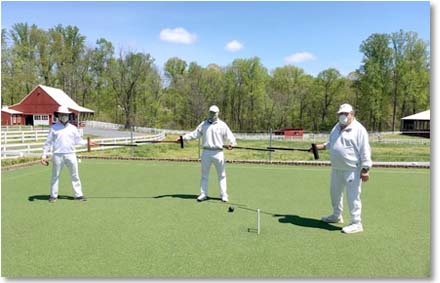
|
| The three masked players on Hal Denton's court in Maryland demonstrating proper "social distancing", are Lee Jorde, Gil Rocha and Rodney Calver. Denton is President of the Croquet Foundation of America, owner of the National Croquet Center. The horse farm, built in 1704, is one of several historic properties owned and restored by the Dentons. |
Massive government bail-outs in many countries that are still insufficient to fill the gap. But there is always "the club," and it turns out that golf and croquet are two of the easiest sports to regulate for "safety." They are both already "socially distanced" as part of the rules. Nevertheless, many clubs, certainly including the corporate ones, require elaborate Liability Waivers players must sign before play.
English players allowed to return to their clubs
In England, croquet was one of eight sports given a governmental green light in mid-May, prompting them all--amidst the British version of political turmoil--to figure out what their stages of re-opening will require of members and of the public. Toy set sales in the UK had increased 600 percent in some reports, as many social pastimes are beyond the bounds of stay-at-homes, but croquet isn't, on the family lawn or even on the carpet.
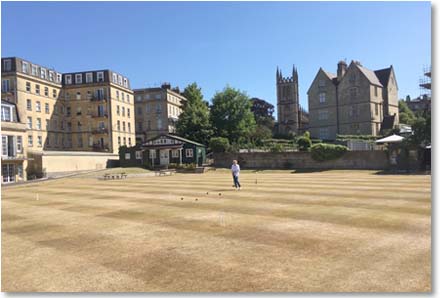
|
| The four-lawn Bath Croquet Club in England opened in extraordinarily dry and sunny weather on June 1. This particular lawn, built for bowling, shows the effects of prolonged dry weather. Photo by Sally Helvey, Bath Croquet Club. |
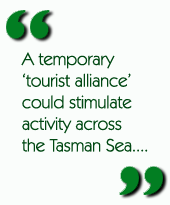 According to the English Croquet Association's marketing director, at least 60 percent of England's croquet clubs were either open or planning to open soon. In America, where localities are deciding and managing pretty much everything as they please, the dominant consideration is the politically correct avoidance of "corporate responsibility" for potential harm.
According to the English Croquet Association's marketing director, at least 60 percent of England's croquet clubs were either open or planning to open soon. In America, where localities are deciding and managing pretty much everything as they please, the dominant consideration is the politically correct avoidance of "corporate responsibility" for potential harm.
In the Southern hemisphere, while associated South Africans now play mostly Golf Croquet, New Zealand and Australia have managed the incursion of the pandemic so well that they are considering a temporary "tourist alliance" to stimulate economic activity across the Tasman Sea, while restricting most foreign incoming travel indefinitely.
The Kiwis lead the way in fighting the pandemic
New Zealand's prime minister Jacinda Ardern announced her government would abandon all coronavirus restrictions after health officials confirmed the recovery of the country's last known Covid-19 case just days ago. Border restrictions will remain in place, meaning only New Zealanders and their families will be allowed to enter the country and must stay in government-run quarantine for a fortnight.
Jenny Clarke of the Kiwi United Club reported earlier this week, "I had a meeting in town today, so parked at our United Croquet Club. It was club day today and the place was packed with people enjoying our current covid-free status. Obviously we have to open up to the rest of the world at some stage, but we'll enjoy the current status."
Competitive play at croquet clubs in New Zealand and may be chilly in their winter, but it is now perfectly okay, with safeguards no longer needed.
A much-discussed "travel bubble" between Australia and New Zealand might eventuate in the near future, without quarantining, when the Ozzies achieve "a similar position" to New Zealand, with no active Covid-19 cases.
England loosens restrictions, despite warnings
With politics almost as erratic as the US, the British government is re-opening business and public enterprises in Britain in slow stages.
Kevin Carter announced that the seven-lawn Surbiton club will be resuming its tournament programme in July, with various restrictions in place and much speculation on the Nottingham Board as to whether only local tournaments should be done, to discourage incoming viral consequences. Nevertheless the announcement said, "Our first tournament will be our annual Summer Handicap on 4th-5th July."
The Nottingham Croquet Club appears to be among the most ambitious re-openers, and plan a previously calendared mid-July event which, however, does not have a flood of entries. James Death announced "availability" on the Nottingham Board on June 2 "We are aiming to run this event but we are currently short of entries. Nottingham GC C level 16th July 2020....Those interested with a GC handicap of 7+ drop me a line or enter via the CA site." The English Croquet Association's excellent and unusually active and successful "marketing director" estimates that "croquet tournaments can resume from July," alongside the expectation that the trend of lockdown easing will continue to early July.
The mask has become a political statement
The wearing of the mask has become an emblem of "liberal" politics in the US, with a president who adamantly refuses to wear a mask in all his encounters. While expert opinion varies on whether and when wearing the masks significantly affects the spread of the virus, experts confirm that the wearer uses the mask to protect other people. Which means that NOT wearing the mask can be interpreted as a sign of contempt, in a society now deeply polarized around apparently simple issues.
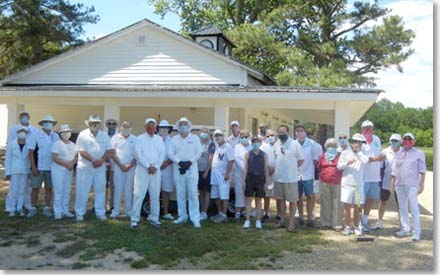
|
| These players gather in front of Macy White's clubhouse at the Chesapeake Bay Croquet Club as part of a series of one-day tournaments, easily socially distanced on eight full-sized croquet courts in coastal Virginia. |
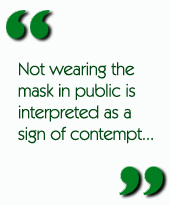 This writer has witnessed a couple of heated exchanges between mask-wearers and people who seem to regard wearing a mask as the act of a wimp. By declining to wear a mask in all his interactions, the country's chief executive encourages Libertarians as well as small-L libertarians to assert their god-given freedom by following his example.
This writer has witnessed a couple of heated exchanges between mask-wearers and people who seem to regard wearing a mask as the act of a wimp. By declining to wear a mask in all his interactions, the country's chief executive encourages Libertarians as well as small-L libertarians to assert their god-given freedom by following his example.
And this despite the current evidence that the United States has counted more deaths from this virus than any other country in the world, as of early June. Epidemiologists say there is no question that the close proximity of thousands of bodies marching and chanting will produce a spike in the numbers. The only question is how big the spike will be.
Close proximity is only the beginning, according to one prominent epidemiologist: "They're yelling, screaming, and, of course, droplets are flying everywhere." Though most protests have been peaceful, some have entailed violent encounters with law enforcement. Tear gas and pepper spray make you cry, "they cause your nose and mouth to secrete mucus—all of which exacerbates spread of the virus. Tear gas can collect on masks, making them unbearable to wear. Some protesters are arrested and taken to jail, where rates of viral transmission are astronomical. Others wait at crowded bus stops or take the subway home, where the virus spreads to friends, neighbors, and family members."
Add all the polarizing political issues to this mix and you predict the additional danger that protesters will be blamed for the spike.
By the numbers, national and global
The statistics on the site we use lists countries according to their total number of reported cases, and begins with the United States, followed by Brazil, Russia, and Spain, in that order. (Many suspect that the "death" count in Russia, so out of proportion with the parallel statistics, is under-counted.)
The confirmed global coronavirus death toll surpassed 410,000 on Tuesday, June 10. The United States, with more than 2 million infections, accounts for more than a quarter of the official global death total, with more than 110,000 since the outbreak began.
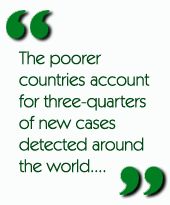 The United Kingdom has the second highest fatality count at more than 40,000, followed by Brazil, Italy, and France. Case counts continue to climb steeply in several other countries, including Russia, Indonesia, Saudi Arabia, and Iran. Brazil is now adding around 25,000 new confirmed cases a day, more than the United States. Russia and India are not far behind, with 8,000 or so apiece.
The United Kingdom has the second highest fatality count at more than 40,000, followed by Brazil, Italy, and France. Case counts continue to climb steeply in several other countries, including Russia, Indonesia, Saudi Arabia, and Iran. Brazil is now adding around 25,000 new confirmed cases a day, more than the United States. Russia and India are not far behind, with 8,000 or so apiece.
All told, poorer countries account for some three-quarters of the 100,000 or so new cases detected around the world each day, and those poor countries are precisely the ones who cannot afford comprehensive testing. In Ecuador, when the system was overburdened, bodies were left in the street.
The politics of the virus
The Los Angeles police officers whose 1992 beating of Rodney King was clearly shown on video were acquitted, sparking an outrage in the largely black and Korean neighborhood soon to be vandalized. King's plaintive quote, "Why can't we all just get along?" remains as a tagline for an event repeated time after time in the US since then, including Michael Brown in Ferguson, Missouri; Trayvon Martin, shot in 2012 by neighborhood watch volunteer George Zimmerman; and recently a black jogger in Georgia. In each case, the damming evidence was video NOT shot by the police, but by a civilian spectator.
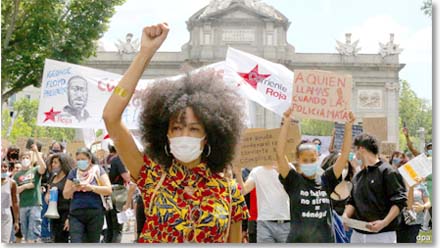
|
| Many countries of the world, it turns out, have their own George Floyd stories to recall in demonstrations that give voice to their anger and frustration in many languages. |
All of this happened at the apex of a pandemic sweeping the globe to which the US did not respond with alacrity.
In the United States, President Trump has been criticized by the Democrats for waiting much too long to take the virus seriously into account, and his recent behavior seems not to have benefited his poll numbers. Several incidents have highlighted the political divide, especially the "photo op" in front of a closed church, bible in hand. Later he appeared, most bizarrely, to invoke from heaven the favor of George Floyd, on "the fantastic job we're doing" with controlling the virus.
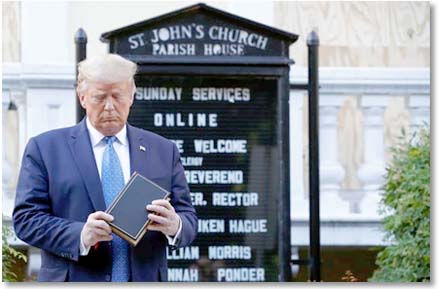
|
| But another widely circulated image of the president dominated the news cycle for several days and is still being deplored. Trump's armed guardians cleared the crowd around the White House with tear gas to allow him to walk to the nearby Episcopal church he sometimes attends, closed for the duration, for a "photo op." Washington's Episcopal Bishop took to the TV networks to express her dismay over what she described as a cynical use of religion. One prominent evangelical (Pat Robertson) commented that using the holy bible as a "prop" was a bad move, while the Reverend Billy Graham and others said it was either okay or perfectly appropriate. Trump has publicly called for all the churches to be re-opened, because "now, what we need is more prayer, not less." One cannot discern from the photo which translation is being displayed, but traditionalists are free to believe that it is King James, the language many appear to believe is favored by God. |
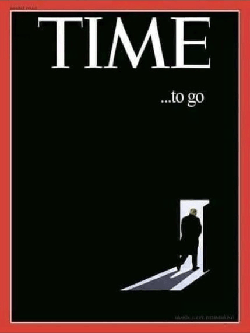
|
| And then someone sent me the following excellent design, which I forwarded it to several friends. It turns out, however, that the superbly designed TIME cover was only a "good idea." |
Prominent American conservative commentator George Will declared in a widely-published editorial that "Trump needs to be gone" from power, along with his "congressional enablers." But most Republican politicians at every level appear to be terrified of Trump's power to exact swift vengeance for any move that seems to run even slightly counter to his intentions.
Your response depends on who and where
and how you are
How each person behaves in this pandemic will affect the eventual resolution of this unprecedented "emergency." No one will predict with certainty when an effective vaccine will emerge, but most experts say "not until 2021" at the earliest.
In the meantime, unless they are restrained by an outside force, many human beings will choose to re-enter the world they remember, take their chances, and behave approximately as "normal," while the most conservative of us will maintain indefinitely a stance of "safety" above all.
It could be that eventual "herd immunity" will occur, but no expert can say precisely when they would be or precisely how it is achieved.
Elderly people have the easiest choices, perhaps: They are the most vulnerable and can choose to sequester themselves indefinitely--prefereably in their own homes. In any kind of profit-making elder care facility in the United States, their lives are at huge risk.
Given all the uncertainty, many will say to themselves and explain to others, "I might as well play croquet."
|
A personal truth about elder care facilities
For a half dozen years I have engaged with many Activity Directors at elder care facilities in the course of entertaining by playing piano. One such activity director, early on, became a close friend and allowed herself to voice to me her many frustrations (which, incidentally, have only multiplied since the "Emergency" was declared in March.) For a long time, there were no cases in her Boynton Beach facility, but two weeks ago, two of the staff were found to have the virus, which resulted in a facility-wide testing for the virus. She regards this as a tedious and ultimately futile exercise in "following the rules," which nowhere acknowledge that most of the "certified nurses" (who can get their certificate in an easy and cheap three-day "course") are paid the minimum wage or as close to it as the owners can get away with. (The manager of the facility, ultimately, is held accountable for holding expenses down, because typically the facility is "owned" by corporations who must compete against other owners to squeeze out a profit.) Her excellent facility, she decided, is not good enough for her own crippled mother. She visits but may not touch her mother in the very expensive new facility, and her mother never sees the staff but gets her meals left in the hallway outside, to ensure no contact at all, ever. Most of the "certified nurses" staffing these facilities are charged with tending personally the residents. They are relatively young, on minimum wage or close to it, with presumably active social lives, who get out and about more and more often as we all become accustomed to living with Covid-19. In Florida and in most US states, these profit-generating care facilities do not have any doctors or skilled nurses, although they are required to employ a Registered Nurse whose main job is to count and regulate the medications given to residents. When health care becomes a profit-making enterprise, another inevitable result is the price-gouging which has escalated the price of a surgical mask costing one dollar in February to as high as seven dollars by the time the bill is given to the care facility in June. So the masks are used over and over again, multiplying the chance to spread the virus. - Bob Alman
|
|
How many weren't filmed?
Excerpts from a recent long article on Cnet.com ask some concerning questions that appear to overbalance significantly in favor of police accounts of contested incidents: "Considering that the majority of videos showing police misconduct at protests have come from citizens rather than from law enforcement or body cameras, it's questionable how much of an effect on accountability requiring body cameras would have. "There have been cases in which body camera videos have shown police misconduct. But some departments have fought tooth-and-nail against releasing footage to the public. A union representing New York police sued in 2018 to prevent body camera footage from being released to the public without a court order, while victims of police abuse have had to sue police to get footage released. "Chicago police didn't release body camera footage of officers shooting 17-year-old Laquan McDonald 16 times until a journalist sued for the video's release. "Police shot and killed David McAtee during a protest earlier this month in Louisville, Kentucky, over the death of George Floyd, but the officers involved didn't have their body cameras turned on, according to reports. This led Louisville Mayor Greg Fischer to fire Police Chief Steve Conrad. "Police have also been able to selectively choose when cameras are turned on, leading to many cases where people are killed by officers wearing body cameras without any evidence to hold them accountable. "Instead, body cameras worn by police increasingly have been used by officers as evidence against suspects rather than to provide transparency."
|
The writer of this article was born in the Deep South in 1939, a white son of special privilege. His family's black servants behaved, along with his own family, he later realized, as they thought they needed to behave. In this famously "closed society," he never heard of "civil rights," and the sermons in his all-white church told him that god intended for the black man to serve the white man; and that slaves were intended by god to obey their masters. At the age of 13, he came to realize that the system he lived in was terribly skewed. He became a Radical Atheist and deeply questioned "the way things are," in both religion and in society.
